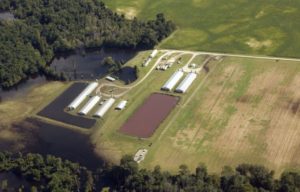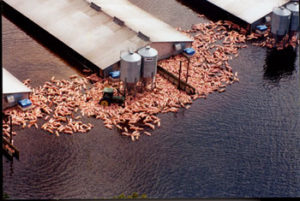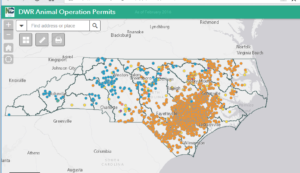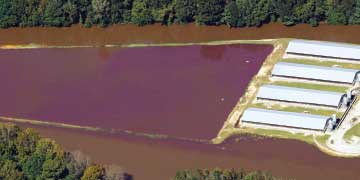Cape Fear River Watch has been advocating, education and taking action on this issue for decades. This is a long battle, and requires not only regulatory changes, but also a broad-scale transformation in consumer attitudes, expectations and spending.
What is a CAFO?
CAFO stands for Concentrated Animal Feeding Operation; it is the process by which most U.S. meat is produced.
In 2016, North Carolina processed 9 million hogs, 818 million broiler chickens, eggs from 9 million egg-laying hens, and more than 33 million turkeys. North Carolina ranks first in the nation in egg production, second in hog and turkey production, and fourth in production of broiler chickens.
With numbers like these, it’s clear this is not our forefathers’ farming. These animals are compactly confined in large facilities where they are raised as efficiently and cheaply as possible to maximize profit.
Smithfield/WH Groups is the largest pork producer in the world, and owns much of our state’s hogs; the packaging plant is located right along the banks of the Cape Fear River where they slaughter around 30,000 hogs every day. (In September 2013 Smithfield Foods was acquired by China’s biggest meat processor, Shuanghui International Holdings – now called “WH Group”, in the largest acquisition of a U.S. company by the Chinese in our history.)
The EPA calls these facilities Animal Feeding Operations or AFOs. An AFO that meets a certain size threshold (based on the number of animals confined) may be deemed a CAFO if it meets certain criteria – only then is it required to obtain a permit.
Why Is It a Clean Water Matter?
All these animals generate massive amounts of waste.
Agricultural corporations (often called integrators in this industry) like Smithfield/WH Group and Perdue own the animals, but the contracted farmers that raise the animals are responsible for managing the waste.
Updating waste management processes is expensive and state regulations are not strong enough to force the integrators to pay for it.
Most hog facilities manage the waste using a “lagoon and spray” system in which waste is pumped from under the animals holding cells to a large open-air pit and then, the bacteria-laden waste is pumped on fields nearby.

Poultry manure is spread over fields in a similar fashion, but the industry has convinced lawmakers that this is a ‘dry’ system – so they do not even require a permit from the DEQ’s Division of Water Resources to run these facilities. With precipitation, this ‘dry’ litter becomes runoff and enters our waterways.
The low-income residents near these facilities – many of whom have lived on their land for generations – are subjected to the noxious fumes caused by waste-spraying, affecting their health, quality-of-life and property values. Nitrogen and phosphorous enter the environment through, runoff, percolation into groundwater and volatilization of ammonia; these nutrients are oxygen-demanding and therefore lead to low dissolved oxygen level in the water, which chokes aquatic systems leading to algal blooms and fish kills. Additional pollution from these facilities includes fecal bacteria, growth hormones, antibiotics, and other chemicals used to clean equipment.
As tropical storms and hurricanes become more frequent, the threat of another instance of massive contamination, as was experienced during Hurricane Floyd, is imminent.

Where Are NC CAFOs located?
Mostly in southeastern North Carolina, primarily low-income, primarily minority neighborhoods.
The Department of Environmental Quality has published the location of the permitted facilities; however, since most of the poultry facilities do not require permits, they are managed by the state’s Department of Agriculture, which considers farm records confidential.

In 2016, Waterkeeper Alliance (of which our Riverkeeper is a member), along with the Environmental Working Group published interactive maps of North Carolina CAFOs , including poultry facilities they located using various methods. Note: at the time they produced the maps, there were 148 million broiler chickens in NC and as of 2016 – there are 818 million, according to the USDAs annual inventory.
Latest Legislative Wins
Cape Fear River Watch has been advocating, education and taking action on this issue for decades. Here are a few of the recent legal ‘wins’ accomplished by Cape Fear River Watch, along with partners like the Southern Environmental Law center and Waterkeeper Alliance.
December, 2017: Waterkeeper Alliance, Cape Fear River Watch and the North Carolina Environmental Justice Network (NCEJN), reached a settlement with the NC Department of Environmental Quality that we hope will ensure prompt, transparent action by the state in response to citizen complaints about animal agriculture operations. This case was brought about after Cape Fear Riverkeeper Kemp Burdette captured time-stamped, geo-located images of CAFO operators spraying waste on fields more than the legally restricted four hours after a flood watch was issued. CFRW submitted this evidence to DEQ but saw no response. This settlement sets a new complaint response protocol, including timelines for prompt response, and public access to reports of complaints and actions taken. More about this settlement can be found here.
October, 2017: Waterkeeper Alliance and the Southern Environmental Law Center reached a settlement with the NC Department of Agriculture requiring that agency to stop charging fees for access to public records. This case was brought about when the agency attempted to charge Waterkeeper Alliance $4,000 to inspect public records related to damage from Hurricane Matthew on hog and poultry farms.
April 26, 2017: About 500 residents living near North Carolina CAFOs have joined a class-action lawsuit under nuisance law (in which owners or renters of property can sue if a practice interferes with public health, safety, peace or convenience). With support from the industry, NC legislators passed a law limiting nuisance settlements to only cover losses in the rental or purchase value of a dwelling, claiming that livestock farms would be otherwise excessively burdened financially. However, last April, legislators amended the bill limiting only FUTURE cases. This is not a win-win, but at least a ‘win’ for the residents involved in the current lawsuit.
January 12, 2017: EPA informed NC DEQ of “deep concern about the possibility that African Americans, Latinos, and Native Americans have been subjected to discrimination as a result of NC DEQs operation of the Swine Waste General Permit program…” This letter was instigated by investigation after Earthjustice filed a complaint on behalf of Waterkeeper Alliance and the Rural Empowerment Association for Community Help (REACH) alleging NC DEQ renewed the permit without adequate measures to control, dispose of and monitor animal waste form industrial swine operations, which subjects minority populations to discriminatory impacts including health issues, increased expenses, noxious odors, nuisances and declining property values). Final findings or resolution have not been announced.

